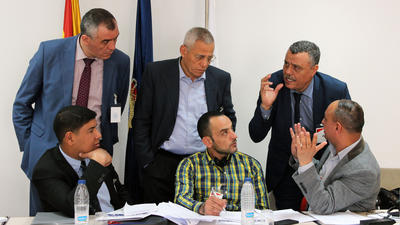-
Our work
-
Fields of work
- Arms control
- Border management
- Combating trafficking in human beings
- Conflict prevention and resolution
- Countering terrorism
- Cyber/ICT Security
- Democratization
- Economic activities
- Education
- Elections
- Environmental activities
- Gender equality
- Good governance
- Human rights
- Media freedom and development
- Migration
- National minority issues
- Policing
- Reform and co-operation in the security sector
- Roma and Sinti
- Rule of law
- Tolerance and non-discrimination
- Youth
- Field operations
- Projects
-
Meetings and conferences
- Summit meetings
- Review Conferences
- Ministerial Council meetings
- Plenary meetings of the Permanent Council
- Plenary Meetings of the Forum for Security Co-operation
- Security Review Conferences
- Annual Implementation Assessment Meetings
- Economic and Environmental Forum
- Economic and Environmental Dimension Implementation Meetings
- Human rights meetings
- Media conferences
- Cyber/ICT security conferences
- Conference of the Alliance against Trafficking in Persons
- Gender equality conferences
- Annual OSCE Mediterranean conferences
- Annual OSCE Asian conferences
- Partnerships
-
Fields of work
-
Countries
- All
-
Participating States
- Albania
- Andorra
- Armenia
- Austria
- Azerbaijan
- Belgium
- Belarus
- Bosnia and Herzegovina
- Bulgaria
- Canada
- Croatia
- Cyprus
- Czechia
- Denmark
- Estonia
- Finland – OSCE Chairpersonship 2025
- France
- Georgia
- Germany
- Greece
- Holy See
- Hungary
- Iceland
- Ireland
- Italy
- Kazakhstan
- Kyrgyzstan
- Latvia
- Liechtenstein
- Lithuania
- Luxembourg
- Malta
- Moldova
- Monaco
- Mongolia
- Montenegro
- The Netherlands
- North Macedonia
- Norway
- Poland
- Portugal
- Romania
- Russian Federation
- San Marino
- Serbia
- Slovakia
- Slovenia
- Spain
- Sweden
- Switzerland
- Tajikistan
- Türkiye
- Turkmenistan
- Ukraine
- United Kingdom
- United States of America
- Uzbekistan
- Asian Partners for Co-operation
- Mediterranean Partners for Co-operation
-
Structures and institutions
- Chairpersonship
-
Secretariat
- Secretary General
- Office of the Secretary General
- Conflict Prevention Centre
- Transnational Threats Department
- Office of the Special Representative and Co-ordinator for Combating Trafficking in Human Beings
- Office of the Co-ordinator of OSCE Economic and Environmental Activities
- Gender Issues Programme
- Opportunities for Youth
- Department of Human Resources
- Department of Management and Finance
- Office of Internal Oversight
- Documentation Centre in Prague
- Institutions
-
Field operations
- Presence in Albania
- Centre in Ashgabat
- Programme Office in Astana
- Programme Office in Bishkek
- Mission to Bosnia and Herzegovina
- Programme Office in Dushanbe
- Mission in Kosovo
- Mission to Moldova
- Mission to Montenegro
- Mission to Serbia
- Mission to Skopje
- Project Co-ordinator in Uzbekistan
- Closed field activities
- Parliamentary Assembly
- Court of Conciliation and Arbitration
- Organizational structure
- About us
News Item
OSCE seeks to strengthen co-operation between participating States and Mediterranean Partners on border security and management
The OSCE points of contact network to strengthen risk analysis and information exchange between the OSCE’s participating States and Mediterranean Partners in the area of border security and management was launched at a roundtable event organized by the OSCE in Madrid from 4 to 6 April 2017 in co-operation with the Spanish National Police...

- Issued on:
- Issued by:
- OSCE Secretariat
- Fields of work:
- Border management
The OSCE points of contact network to strengthen risk analysis and information exchange between the OSCE’s participating States and Mediterranean Partners in the area of border security and management was launched at a roundtable event organized by the OSCE in Madrid from 4 to 6 April 2017 in co-operation with the Spanish National Police.
The discussion brought together more than 30 participants from Algeria, Greece, Jordan, Israel, Morocco, Portugal, Spain and Tunisia as well as representatives from Frontex, Europol, and the International Organization for Migration (IOM). Participants shared experiences, views and good practices on how to enhance co-operation in addressing a range of cross border crimes, such as the illicit trafficking of weapons, drugs and human beings.
“The launching of the points of contact network with the Mediterranean Partners provides us with a new platform to better address the diverse security challenges in the OSCE area,” said Dennis Cosgrove, Head of Border Security and Management Unit at the OSCE Secretariat’s Transnational Threats Department.
Maria Antonia Mena Lopez, Deputy Head of the Division of International Co-operation at the Spanish National Police, said: “This is a perfect occasion to examine the geostrategic positions of the countries participating in this meeting, exchange views on border security and risk management and what we can offer to each other in the Mediterranean region.”
A representative of Frontex’s Risk Analysis and Management Unit said that the establishment of active information-sharing networks and the improvement of analytical capabilities are crucial to supporting effective border security measures to respond to the risks and threats in the Mediterranean.
The discussion, which concluded with a set of recommendations, is part of an OSCE multi-year initiative aimed at strengthening co-operation mechanisms between the border security and management agencies of the OSCE participating States and the Mediterranean Partners for Co-operation. The project is implemented in close co-operation with organizations such as Frontex, Europol, IOM, the UN Counter-Terrorism Centre and the UN Office on Drugs and Crime.